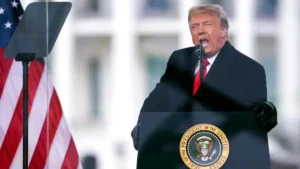Introduction
Former President Donald Trump’s legal challenge to return to the White House faces a critical juncture as the U.S. Supreme Court prepares to deliberate on his eligibility. The focal point of contention revolves around a Colorado Supreme Court ruling, challenging Trump’s qualification for the presidency under the 14th Amendment. Let’s delve into the intricacies of this legal challenge.
Understanding the 14th Amendment
The 14th Amendment stands as a cornerstone of constitutional rights, particularly concerning citizenship, due process, and equal protection. Within its framework lies Section 3, a provision aimed at safeguarding the integrity of public office by barring individuals who have engaged in insurrection from holding positions of power. This provision has become the center of attention in Trump’s legal challenge.
Trump’s Alleged Violation in the Legal Challenge
At the heart of the legal challenge lies the interpretation of Trump’s actions leading up to and during the Capitol riot on January 6, 2021. His detractors argue that his rhetoric and actions amounted to incitement and insurrection, thereby potentially disqualifying him from future presidential bids under Section 3.
Legal Interpretation of Insurrection
Legal experts spar over the definition of insurrection and its applicability to Trump’s conduct within the legal challenge. While some assert a direct correlation between his behavior and the spirit of the law, others contend that the context and intent behind his actions are pivotal in determining culpability.
Trump’s Defense Arguments
Trump’s legal team mounts a vigorous defense within the legal challenge, challenging the constitutionality of applying Section 3 to a former president. They argue that the language of the provision, focusing on specific offices and oaths, does not explicitly encompass the presidency. Moreover, they question the procedural fairness of the proceedings, emphasizing due process concerns.
Legal Precedents and Unprecedented Cases
Historical context sheds light on the rarity of cases invoking Section 3 within the legal challenge. Despite its inclusion in the post-Civil War era, its utilization remained sporadic until Trump’s presidency. The novelty of his case underscores its significance in shaping future legal interpretations.
Political Divide and Legal Standpoints

The debate transcends partisan lines, with divergent views among legal scholars and political factions within the legal challenge. While some perceive the case as a partisan maneuver, others advocate for strict adherence to constitutional principles, irrespective of political affiliations.
Partisan Reactions
Democrats and Republicans exhibit varied stances on Trump’s eligibility, reflecting broader ideological tensions within the political landscape amidst the legal challenge. The filing of the case by Citizens for Responsibility and Ethics in Washington highlights the intersection of legal advocacy and political agendas.
Conservative and Liberal Legal Views
Contrary to expectations, conservative legal scholars express reservations about Trump’s candidacy, citing constitutional fidelity as paramount within the legal challenge. The nuances of Section 3 prompt a reevaluation of traditional party allegiances, as evidenced by divergent opinions within Colorado’s Supreme Court.
Potential Supreme Court Rulings
As the Supreme Court deliberates, three potential outcomes loom large, each carrying profound implications for Trump’s political future and the interpretation of Section 3.
Upholding Colorado’s Decision
Should the Supreme Court affirm Colorado’s ruling, it would signal a precedent-setting verdict, reinforcing the applicability of Section 3 to presidential candidates within the legal challenge.
Disqualifying Trump Under Section 3
Conversely, a ruling against Trump could definitively bar him from seeking office, crystallizing the legal ramifications of his actions.
Possibility of Indecision and its Ramifications
The prospect of an inconclusive verdict raises concerns about prolonged legal battles and political uncertainty. Indecision could exacerbate existing divisions and invite further litigation, prolonging the resolution of Trump’s eligibility within the legal challenge.
Ramifications Beyond Trump
Beyond Trump’s case lies a broader impact on future electoral contests and constitutional interpretations.
Potential Impact on Future Cases
The outcome of Trump’s Supreme Court legal challenge sets a precedent for addressing similar disputes in the future, shaping the boundaries of executive eligibility.
Counter-Challenges and Political Implications
The specter of counter-challenges and retaliatory legal actions looms large, underscoring the far-reaching consequences of the Supreme Court’s decision in the legal challenge.
Conclusion
In conclusion, Trump’s Supreme Court case transcends individual candidacy, epitomizing the intersection of law, politics, and constitutional interpretation within the legal challenge. As the judicial deliberations unfold, the nation awaits a pivotal verdict that will reverberate across legal and political spheres.
FAQs
- Is Trump’s case purely partisan?
Ans: No, the legal arguments and interpretations span ideological divides, with implications for constitutional principles beyond partisan agendas.
- What are the potential outcomes of the Supreme Court ruling?
Ans: The Supreme Court could uphold Colorado’s decision, disqualify Trump under Section 3, or leave the matter unresolved, each carrying distinct ramifications.
- How does Trump’s case impact future presidential candidates?
Ans: The verdict sets a precedent for evaluating candidates’ eligibility, influencing future electoral contests and legal challenges.
- Are there parallels between Trump’s case and historical precedents?
Ans: While Section 3 has rarely been invoked, Trump’s case underscores the evolving interpretation of constitutional provisions in contemporary contexts.
- What role does due process play in Trump’s defense?
Ans: Trump’s legal team emphasizes procedural fairness, raising concerns about the constitutionality of the proceedings and the preservation of individual rights.
More info: Nikki Tucker: Trump’s Running Mate